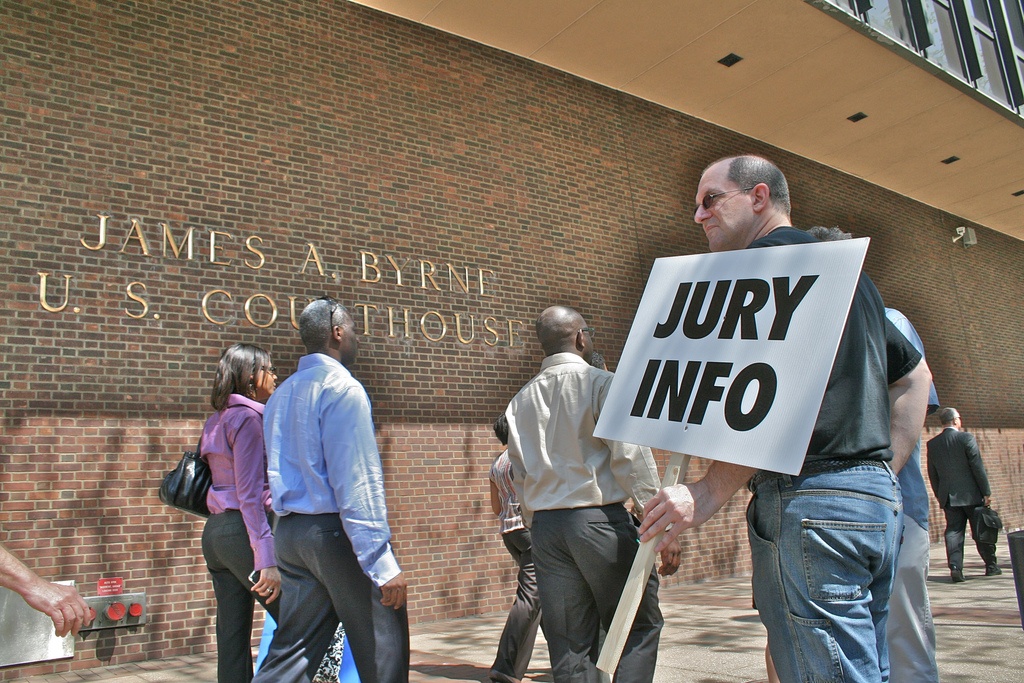Jury trials are just not happening anymore, according to a New York Times article this week.
The cost of a trial, the risk of a harsher sentence at trial and the power of prosecutors are all so great, that most of those accused of a federal crime are opting for plea deals.
What percentage of federal convictions in 2015 came after a trial? 2%. That means 98% of the 81,000 federal convictions in 2015 alone were carried out without a trial.
Why it Matters
Here’s why that matters.
Only a thin shred of evidence is required to arrest and prosecute you — much less evidence than is required to convict you.
I learned this the hard way in May of 2010 when a group of US Marshals conspired to accuse me of assulting one of them — when one of them had actually assaulted me. I was in a cage, facing 8 years in federal prison and a minimum $15,000 lawyer’s bill within moments.
Law enforcement officers face very few limits in 21st century America. They’re seizing cash, they’re collecting evidence illegally and then falsifying its chain of collection (parallel construction) and, together with prosecutors and judges, they can put anyone away for anything they like, if they want it badly enough.
And the lawyers jump to the head of the line to get their share of your life savings.
These Juries are not of your Peers
Even if you can finance a jury trial, even if you can get bail and endure the onerous release conditions, then you face the modern jury trial.
We’re told we get a jury of our peers. This is a lie. We get a jury of government employees.
Civil servants are the only people who can get paid time off to participate in a jury trial.
Ross Ulbricht Trial an Example
We saw this in the Ross Ulbricht trial. His jury was largely government employees, people primed and practiced in taking orders from other government employees, such as prosecutors and judges. People whose role is little more than to rubber-stamp the prosecution.
People have been fighting since at least before the signing of the Magna Carta in 1215 to have juries, not of nobles or some other privileged class of people, but of your peers — people similar to you who are likely to understand the kind of life you lead.
This is what qualifies juries to judge your guilt or innocence: they’re like you.
Not anymore.
Opportunities
This rise of unbridled prosecutorial power, the disappearance of jury trials and the subversion of those few remaining jury trials at the federal level opens a couple opportunities for those of us who’d like to live in a more just world.
Jury rights activists can have a greater impact. With fewer trials, that’s fewer juror summons events that you need to cover.
That’s if you think you’re going to convince an obedient government employee, a colleague of the prosecutor and judge, to challenge their authority.
Blockchain Justice
There’s also an opening for blockchain justice in the form of the private resolution of disputes via arbitration.
This is a long-term vision that won’t happen overnight. But here’s the theory.
DROs
Individuals who wish to safely associate with each other in a potential future can purchase insurance coverage from a Dispute Resolution Organization (DRO) (a la BitNation perhaps) that would likely conduct business on a blockchain.
The insurance would cover many eventualities and serve like the posting of a bond. Break the society’s rules, fail to honor your contracts and the injured parties will get relief from your DRO.
If you’re at fault, your DRO will raise your rates or possibly even drop your coverage – thus removing your ability to fraternize with those people who only associate with other DRO-covered individuals.
Arbitration
Disputes are resolved through arbitration, a very successful private dispute resolution method in use in the private sector today.
No one has a monopoly on providing the service of arbitration. So they can’t make you wait months or years for trial. You might be able to represent yourself.
You might even be able to pick your own judge and jury by having a say, together, with the opposing party, in choosing the arbitrators.
Even if you lose, private justice likely wouldn’t require you go to the penitentiary for long stretches. There are no minimum sentencing laws in private arbitration. You might even be able to just make reparations and pay the winning side’s court costs.
Take Action
There’s a world of alternative options for justice and dispute resolution beyond the government system — a system that has erased its own veneer of legitimacy by tilting the playing field of justice in its own favor.
It’s time we started not just considering them but actively working to make the best ones a reality.
